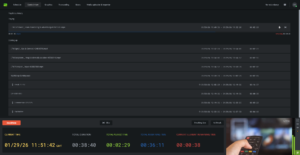- Deploying SRT for primary distribution enables Grupo RBS to cut playout centres from twelve to one centralised super-playout centre in Porto Alegre, Brazil
- The X Platform enables Grupo RBS to deploy advanced techniques, including SPMTE 2110 encoder, hitless switchover, NMOS and PTP
- Appear’s SRT solution provides the lowest cost for channel transmission over the public internet, enabling operators to confidently replace expensive satellite links and dedicated fibre circuits
Appear, the global leader in live production technology, has been chosen by Grupo RBS, one of the largest media conglomerates in Brazil, to deploy Secure Reliable Transport (SRT) primary distribution solutions, so that it can centralise MCR and playout functionality at a single site. This deployment utilizes Appear’s hardware accelerated SRT technology to connect 11 sub-affiliate sites across Brazil, all of which previously had MCR and playout functionality, with its Master Control Room (MCR) and playout operation in Porto Alegre, Brazil.
“Centralising our MCR and playout operations required a robust solution that seamlessly connects a multitude of feeds from various sites across South of Brazil into our facility in Porto Alegre. Appear’s SRT-enabled X Platform meant we could integrate feeds from different interfaces and sources with ease,” said Roberto Hoffmann, Engineering Manager at Grupo RBS.
“Appear’s proactive approach in understanding our needs from the beginning was paramount to the project’s success. It was actively involved in the proof-of-concept process, proposing effective solutions that perfectly aligned with our needs. Moreover, the X Platform met all technical requirements and was the right size for the project. Our partnership with Appear not only enhances our operational efficiency, but also paves the way for better broadcast experiences in Brazil, through reducing points of failure and enabling us to concentrate on ensuring that our single super-playout centre is the most advanced in LATAM,” concluded Hoffmann.
SRT is rapidly becoming the preferred protocol for primary video distribution for broadcasters thanks to its ability to overcome the obstacles of traditional broadcast delivery over unreliable networks. This is especially important when streaming content from central playout facilities to geographically dispersed local affiliate stations. One of the main challenges in primary distribution over the public internet is ensuring broadcast-quality signal integrity, where packet loss, jitter, and unpredictable bandwidth can challenge traditional transport protocols. SRT effectively tackles these issues with error correction mechanisms, adapting to network quality. With its industry-leading scalability and density, it was the ideal solution to enable Grupo RBS to integrate and optimise its MCR and playout workflows.
“The hardware acceleration of our professional grade SRT technology opens the way for media and entertainment companies like Grupo RBS to revolutionise its MCR and playout infrastructure,” says Luis Perez, Sales Director LATAM at Appear.
“The ability of our X Platform to provide industry leading density and support for SRT, SMPTE 2110, NMOS, and PTP technology delivers a quantum leap in flexibility and efficiency. Enabling Grupo RBS to provide superior viewer experiences and set new industry benchmarks for efficiency and flexibility,” concluded Perez.
Appear’s SRT solution provides the lowest cost for channel transmission over the public internet, enabling operators to confidently replace expensive satellite links and dedicated fibre circuits. Additionally, SRT empowers operators to reduce the transport budget of moving studio functionality such as media asset management to the cloud. In a single 2RU chassis, Appear’s X20 Platform as an SRT gateway can handle up to 1,536 connections (12 cards x 128 connections per card) and up to 72Gb of SRT traffic, saving space and power consumption at a much lower cost base. SRT also enables organizations to change the economics of migration to Internet distribution in their favour.









